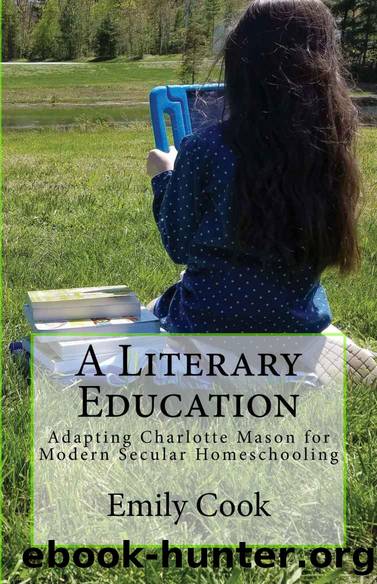A Literary Education by Cook Emily

Author:Cook, Emily
Language: eng
Format: epub
Publisher: Build Your Library Press
Published: 2017-05-27T00:00:00+00:00
Grammar
That isnât to say that you shouldnât ever teach formal grammar. Yes, teaching it in context is a fantastic way to learn, but unless you are an expert on the subject, you are likely to miss things that your child will need to know. I like to study grammar in-depth just a handful of times over the years. I recommend studying it around age 8 or 9, again around the age of 12, and then once more at the beginning of the high school years. I find that this is plenty â it isnât a subject that warrants yearly study outside of copywork and dictation. But by covering it more in-depth at each level (elementary, middle grades, and high school) you give your child the foundation needed to be a good communicator.
As far as recommendations for programs go, in the elementary years I like Easy Grammar. Itâs a solid, no-frills program. In the middle grades, my children have really enjoyed The Giggly Guide to Grammar by Cathy Campbell and Ann Dumaresq. At this age level, Iâve found that my children tend to think they already know everything about grammar and find it tedious. But a book like The Giggly Guide Grammar makes it silly and fun, and I get a great deal less eye-rolling when itâs time to study. At the high school level, you can go back to Easy Grammar and use their Easy Grammar Plus program that is written for Jr. High â Adult level.
Vocabulary in Context
A wide vocabulary is a necessity to success in life â it will improve your childâs ability to understand other peopleâs ideas, to be able to read extensively (and comprehend what they read), and articulate their thoughts clearly to others. But Iâm convinced that you do not need to purchase any additional curriculum in order to build your childâs vocabulary.
You can easily develop your childâs vocabulary through, you guessed it, reading great literature. When they learn a new word in context, and they see it repeatedly over time, theyâll retain it and add it to their own vocabulary. Learning new words in context just makes sense. The words will come alive within a story and burrow into their mind.
For example â if I just asked my child to randomly define this list of words:
- ominous- perilous
- venture- slither
They will grab a dictionary and do the assignment, but within a few days, they will probably have forgotten those words entirely. But, if they were to also read this passage:
âFrom there itâs a simple matter of entering the Mountains of Ignorance, full of perilous pitfalls and ominous overtones â a land to which many venture but few return, and whose evil demons slither slowly from peak to peak in search of prey.â â The Phantom Tollbooth (1961) by Norton Juster
Suddenly, that same list of words come to life and make sense in a whole new way.
Even before your child learns to read, you can begin developing their vocabulary, by reading them the best literature you can find.
Download
This site does not store any files on its server. We only index and link to content provided by other sites. Please contact the content providers to delete copyright contents if any and email us, we'll remove relevant links or contents immediately.
The Art of Coaching Workbook by Elena Aguilar(51198)
Trainspotting by Irvine Welsh(21663)
Twilight of the Idols With the Antichrist and Ecce Homo by Friedrich Nietzsche(18632)
Fangirl by Rainbow Rowell(9249)
Periodization Training for Sports by Tudor Bompa(8271)
Change Your Questions, Change Your Life by Marilee Adams(7780)
This Is How You Lose Her by Junot Diaz(6885)
Asking the Right Questions: A Guide to Critical Thinking by M. Neil Browne & Stuart M. Keeley(5775)
Grit by Angela Duckworth(5614)
Red Sparrow by Jason Matthews(5471)
Paper Towns by Green John(5189)
Room 212 by Kate Stewart(5119)
Ken Follett - World without end by Ken Follett(4731)
Housekeeping by Marilynne Robinson(4446)
The Sports Rules Book by Human Kinetics(4386)
Papillon (English) by Henri Charrière(4274)
Double Down (Diary of a Wimpy Kid Book 11) by Jeff Kinney(4268)
The Motorcycle Diaries by Ernesto Che Guevara(4098)
Exercise Technique Manual for Resistance Training by National Strength & Conditioning Association(4071)
